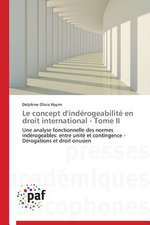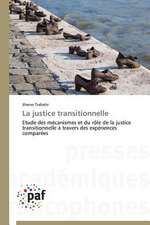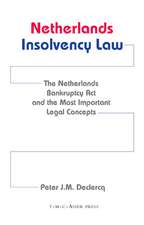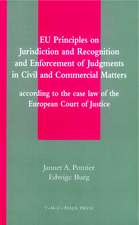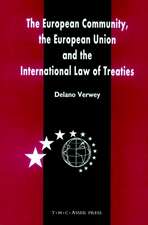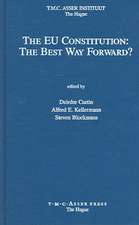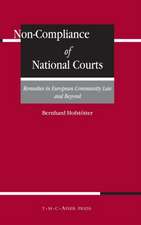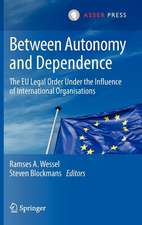The Impact of EU Accession on the Legal Orders of New EU Member States and (Pre-) Candidate Countries: Hopes and Fears
Editat de Alfred E. Kellerman, Anneli Albi, Jenõ Czuczai, Steven Blockmans, Wybe Th. Doumaen Limba Engleză Hardback – 4 mai 2006
With a Foreword by Jaap de Zwaan
On 1 May 2004, ten countries joined the European Union as Member States. In that same year, five other countries (Bulgaria, Croatia, Romania, Serbia and Montenegro, and Turkey) had or received (pre-)candidate country status. EU accession requires a great number of adaptations in the laws and policies of a country. In order to analyse the impact of these developments and support the countries concerned, the T.M.C. Asser Institute in The Hague initiated a project originally entitled ‘The impact of EU accession for the acceding Member States and (pre-)candidate countries’. The project, which was approved by the Dutch Ministry of Foreign Affairs and financed under the Ministry’s Matra Programme, started at the beginning of 2003 and concluded during the Dutch EU presidency with a final conference in The Hague in October 2004.
In preparation for this conference, a group of distinguished experts from the fifteenparticipating countries analysed, according to identical guidelines, the impact of accession on the organization of their national governments, parliaments and judiciaries, as well as on their national constitutions. Their research activities resulted in fifteen country reports offering a multitude of interesting insights, views and experiences. In 2005, the reports were updated by the authors and editors of this book, so that they could be made available to the wider public. As a comparative study of fifteen countries, it is an excellent guide for the preparation of the national legal orders for EU accession, for briefing and training civil servants, judges, practitioners, officials of international organizations and academics, and for post-graduate students.
The multi-country research project was carried out by, and under the guidance of, Alfred E. Kellermann, T.M.C. Asser Institute, Jenö Czuczai, European Law Academy Budapest, Steven Blockmans,T.M.C. Asser Institute, and Anneli Albi, University of Kent. They also formed the editing team of the book, which was further complemented by Wybe Th. Douma, T.M.C. Asser Institute.
Preț: 584.69 lei
Preț vechi: 721.84 lei
-19% Nou
Puncte Express: 877
Preț estimativ în valută:
111.90€ • 116.39$ • 92.38£
111.90€ • 116.39$ • 92.38£
Carte tipărită la comandă
Livrare economică 08-14 aprilie
Preluare comenzi: 021 569.72.76
Specificații
ISBN-13: 9789067042178
ISBN-10: 906704217X
Pagini: 465
Ilustrații: XXIV, 465 p.
Dimensiuni: 163 x 245 x 33 mm
Greutate: 0.91 kg
Ediția:1st Edition.
Editura: T.M.C. Asser Press
Colecția T.M.C. Asser Press
Locul publicării:The Hague, Germany
ISBN-10: 906704217X
Pagini: 465
Ilustrații: XXIV, 465 p.
Dimensiuni: 163 x 245 x 33 mm
Greutate: 0.91 kg
Ediția:1st Edition.
Editura: T.M.C. Asser Press
Colecția T.M.C. Asser Press
Locul publicării:The Hague, Germany
Public țintă
ResearchCuprins
Hopes and Fears.- Hopes and Fears.- Matra Project Countries.- Bulgaria.- Croatia.- Romania.- Serbia and Montenegro.- Slovenia.- Turkey.- Comparative Analyses.- Impact of European Integration on National Constitutions and Parliaments.- Impact of European Integration on the Role and Functioning of the National Judiciary.- Impact of Eu Accession on the Role of (Potential) Candidate Countries’ Executives.- New Member States.- Cyprus.- Czech Republic.- Estonia.- Hungary.- Latvia.- Lithuania.- Malta.- Poland.- Slovak Republic.
Textul de pe ultima copertă
With a Foreword by Jaap de Zwaan
On 1 May 2004, ten countries joined the European Union as Member States. In that same year, five other countries (Bulgaria, Croatia, Romania, Serbia and Montenegro, and Turkey) had or received (pre-)candidate country status. EU accession requires a great number of adaptations in the laws and policies of a country. In order to analyse the impact of these developments and support the countries concerned, the T.M.C. Asser Institute in The Hague initiated a project originally entitled ‘The impact of EU accession for the acceding Member States and (pre-)candidate countries’. The project, which was approved by the Dutch Ministry of Foreign Affairs and financed under the Ministry’s Matra Programme, started at the beginning of 2003 and concluded during the Dutch EU presidency with a final conference in The Hague in October 2004.
In preparation for this conference, a group of distinguished experts from the fifteen participating countries analysed, according to identical guidelines, the impact of accession on the organization of their national governments, parliaments and judiciaries, as well as on their national constitutions. Their research activities resulted in fifteen country reports offering a multitude of interesting insights, views and experiences. In 2005, the reports were updated by the authors and editors of this book, so that they could be made available to the wider public. As a comparative study of fifteen countries, it is an excellent guide for the preparation of the national legal orders for EU accession, for briefing and training civil servants, judges, practitioners, officials of international organizations and academics, and for post-graduate students.
The multi-country research project was carried out by, and under the guidance of, Alfred E. Kellermann, T.M.C. Asser Institute, Jenö Czuczai, European Law Academy Budapest, Steven Blockmans, T.M.C. Asser Institute, and Anneli Albi, University of Kent. They also formed the editing team of the book, which was further complemented by Wybe Th. Douma, T.M.C. Asser Institute.



